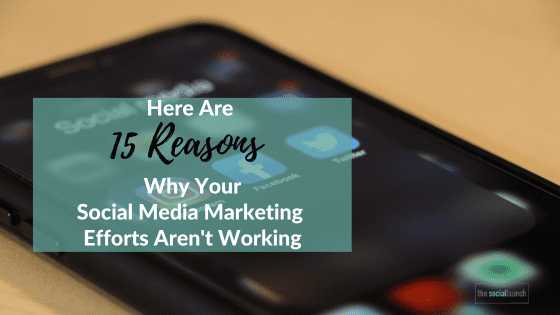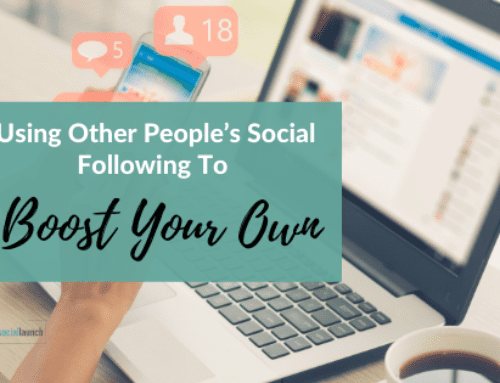It’s no secret that social media has become a big deal for businesses and other organizations looking to increase their brand awareness.
Most people use at least one social network daily, making social media the perfect way to reach target audiences worldwide. For many firms, social media forms part of their ongoing SEO (search engine optimization) strategies.
However, the ugly truth is that many businesses aren’t doing their social media marketing in the most effective ways. Moreover, some spend large chunks of their marketing budgets on PPC (pay-per-click) campaigns for social media with little return on their investments.
You’re likely reading this article today because you want to avoid making common social media marketing mistakes. If any of the following 15 examples ring true for your business, it’s likely your campaigns need reviewing urgently:
1. Targeting The Wrong People
Social Media Optimization, or SMO, is similar in many respects to ordinary website SEO. You determine your target audience and ensure your online platforms offer relevant content to them. Unfortunately, some businesses aren’t targeting specific audiences.
As a result, their content may get promoted to people with little to no interest in their brand or what they’re offering. Don’t make that same mistake; spend some time determining your social media target audience.
Thankfully, it’s straightforward for content creators to organically seek out users most likely to engage with them.
2. Targeting The Same Keywords In Similar Content
There’s a term in the SEO world called keyword cannibalization. It refers to the (incorrect) practice of targeting the exact keywords across multiple pages on a website.
The trouble is that some businesses inadvertently do the same thing when promoting content on their social media profiles!
For instance, if you have two Facebook posts about the same product but in different colors and use the exact keywords for your PPC campaigns for both posts, you devalue your content from an SEO perspective.
Luckily there are many ways to fix cannibalization in SEO – you just need to recognize if that’s a problem with your social media promotions, as it will ultimately waste your marketing budget if left undetected.
3. Infrequent Social Media Posts
You must be consistent with your social media marketing and SMO efforts. If you aren’t, the likelihood is high that your target audience will unfollow or unlike your pages, or even worse, buy from your competitors that are consistent with their marketing!
Of course, committing to posting specific amounts of content on social media every week or even daily can be challenging. The good news is that you can write new content and schedule those future posts for publication according to your requirements.
4. Failing To Use Management Software
Online tools like HootSuite make it easy for businesses to manage and curate content across their social media profiles. They provide centralized “dashboards” where users can write new content, schedule it for future release, and review messages and mentions.
They are undoubtedly time-saving tools and are inexpensive to use. If you aren’t using such a tool for social media promotions and audience engagement, you could be wasting a lot of time and money by posting content manually across various social networking platforms!
5. Ignoring Social Media Analytics
Do you know how many people are interacting with your social media posts? Where are those users from, and what brought them to your content? Do you know if any of your social media followers visited your website by clicking or tapping on links from specific posts?
If you’re scratching your head at this point, the chances are high that you aren’t using social media analytics.
A quick Web search will reveal many online analytics tools you can use with your social profiles, so it makes sense to review and compare them before using the best one.

6. Forgetting To Engage With Followers
It’s an obvious fact that social media is a two-way communication medium. That means you should be talking to your fans, followers, and those who comment on your posts.
Unfortunately, some businesses make the fatal mistake of forgetting to engage with people online!
You don’t need to respond to every emoji reaction or comment on your posts. Instead, reply to people asking questions or sharing unfounded opinions that might damage your online reputation.
Again, you can use an online social network management tool to help you manage all interactions.
7. Paying For Incorrect PPC Targeting
PPC campaigns are fantastic ways to boost traffic to your social media profiles and increase brand visibility across the Internet. Unfortunately, many people in charge of paid social media marketing are blowing their budgets due to incorrect audience targeting.
As with the first point in this article, it’s crucial that you target the right people. The only difference between the two points is that the first refers to organic audience targeting, whereas this refers to paying for targeted traffic.
Social networks like Facebook, Instagram, and Twitter offer PPC marketers special tools to help them target specific audiences.
8. Adding Little Value To Content
There’s no point in creating new content on your social media profiles for the sake of it. The people that follow your profiles do so because they hope to consume relevant, valuable content in your posts – especially those that help them in their lives somehow.
It will help if you put some thought into the planning for your new content. For example, a new product demonstration video can help customers learn more about what you’re selling and become more engaged with your brand.
9. Inconsistent Brand Messaging
Did you know that a common mistake made by many businesses is being inconsistent with their brand messaging? Building a solid and cohesive online brand identity is crucial, as inconsistent messaging can confuse your fans and followers.
Moreover, inconsistent brand messaging will dilute the impact you’re trying to achieve with your social media marketing efforts. Some tips to achieve consistent brand messaging include:
- Using the same tone in all your posts;
- Avoiding contradictory statements; and
- Using the same visual styles in images and video content.
10. Ignoring User-Generated Content
One of the most challenging things any online marketer must do is win the trust of their target audiences. People can often be skeptical about new brands, products, or services, so they must feel convinced that their purchasing decisions are sound.
User-generated content, such as short video clips or photographs of them using your products and services, can help build trust with your target audience.
But you must remember to share such content with your fans and followers (after getting permission from the content creator, of course)!

11. Forgetting To Provide Good Customer Service
Your social media fans and followers will likely ask questions about the things you sell and the purchases they’ve made. They might be general questions, although some may require offline investigation, such as checking order details.
Social media is a convenient way for people to ask questions compared with emailing or phoning your business. Ensure you answer all questions directed to your company and always provide excellent customer service.
12. Refusing To Work With Influencers
Successful social media influencers have vast fan or follower numbers, and because they are so well-engaged with their audiences, products and services endorsed by them will often get used by those people.
As you can appreciate, working with social media influencers makes sense because they give you instant access to people in your target demographic. Don’t dismiss the idea if you’re serious about boosting your social media marketing!
13. Unrealistic PPC Budgets
Any meaningful social media marketing strategy will involve paying for PPC campaigns.
Of course, some businesses spend more on their PPC budgets than others due to various factors. However, you should not underspend on your PPC campaigns; you will only reach a few people in your target audience if you have a small budget.
Moreover, some PPC platforms won’t offer as good an ROI (return on investment) if you only spend a fraction of what you need to on your PPC marketing budgets.
14. Failing To Address Negative Sentiment
There isn’t a business on the planet that hasn’t received negative feedback for some aspect of its operations. The Internet, particularly social media, makes it easy for consumers to vent their dismay about brands.
If there is some negative sentiment about your brand, don’t ignore it. Instead, take ownership of any issues and investigate each customer’s complaints.
Use each case as an educational experience for your brand, and remember to respond publicly with the steps you’ve taken to address any issues.
15. Having No Clear Goals
Lastly, one reason a brand’s social media strategy and campaigns might suck is due to a simple point: they don’t know what they want to achieve!
Knowing that you should “be on social media” is one thing. However, if you don’t know how it can benefit your business, it makes sense to talk to a social marketing expert about this or spend some time researching the subject online.
Afterward, you can define some clear goals for your business to achieve.






